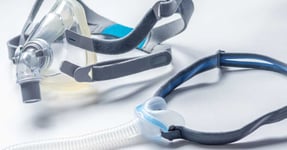The Right CPAP Mask for Your Sleeping Position
There are five common types of CPAP masks, which is best for you?

Device setup: 888.492.7742
All others: 877.265.2426
First step, call Apria as soon as you receive your PAP therapy device.
Our sleep coaches are available to answer questions about the setup process and troubleshooting issues at 877.265.2426, option 4
Choose how you want to set up your device — virtual, in-person, or self-directed.
![]()
You can always schedule a video consultation with an Apria sleep coach or an in-person session with your local Apria branch representative.
During the first month of PAP therapy, it is important to wear your PAP therapy at least 4 hours per night.
Apria is here to support you!
Sleep Coaches — To support and provide education
Monitoring — Therapy adherence monitoring by sleep coaches
Helpful Reminders — Automated reminders through email, text or a phone call to keep track of your therapy needs
App — Download the manufacturer’s app in order to track your adherence
In your second month of PAP therapy, you should have an appointment scheduled with your physician to review your progress.
Technology — Apria monitors your PAP unit remotely and provides adherence data to your physician.
Apria support is always available at 877.265.2426, option 4
Stay connected to Apria by signing up for our newsletter and our Home Healthcare Insights blog.
![]()
Sign Up for Apria Email Newsletters at Apria.com/Email.
Continue wearing your PAP therapy for more than 4 hours each night.
It’s now time to prepare for ongoing therapy success by refreshing your sleep supplies regularly
![]()
Speak directly to a live Sleep Expert at 877.265.2426 or register online for our Supplies on Schedule program at info.apria.com/supplies.
Be sure you have annual follow-up appointments with your physician to discuss your PAP therapy success.
Need a travel PAP unit? Additional retail resources are available at ApriaDirect.com.
After 5 years, you may be eligible for a new replacement PAP machine.
Resources
Watch this video to learn how Apria Sleep Care can help you!

There are five common types of CPAP masks, which is best for you?

Our veteran clinicians answer frequently-asked questions and share their tips for success for CPAP therapy.

Increase the humidity level.
Refer to the Apria User Guide that came with your device for detailed steps for your device. Access the Apria User Guide online in our Product Manuals center.
Adjust your mask or headgear. It may need to be repositioned.
Refer to instructions provided in the manufacturer's user guide for your mask.
Your mask may be too tight. Try adjusting the headgear. If redness persists, contact Apria.
You may be swallowing air. Turn on the Ramp feature. The air pressure will start lower and increase over time.
Refer to the Apria User Guide that came with your device for detailed steps for your device. Access the Apria User Guide online in our Product Manuals center.
You may have a sinus or ear infection. Stop using your machine and contact your doctor.
Decrease the humidity level.
Refer to the Apria User Guide that came with your device for detailed steps for your device. Access the Apria User Guide online in our Product Manuals center.
Turn on the Ramp feature. The air pressure will start lower and increase over time.
Refer to the Apria User Guide that came with your device for detailed steps for your device. Access the Apria User Guide online in our Product Manuals center.
Turn off the Ramp feature when initiating your therapy before sleep. Ramp allows for air pressure to start lower and increase over time.
Refer to the Apria User Guide that came with your device for detailed steps for your device. Access the Apria User Guide online in our Product Manuals center.